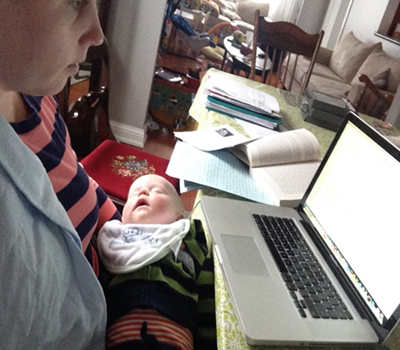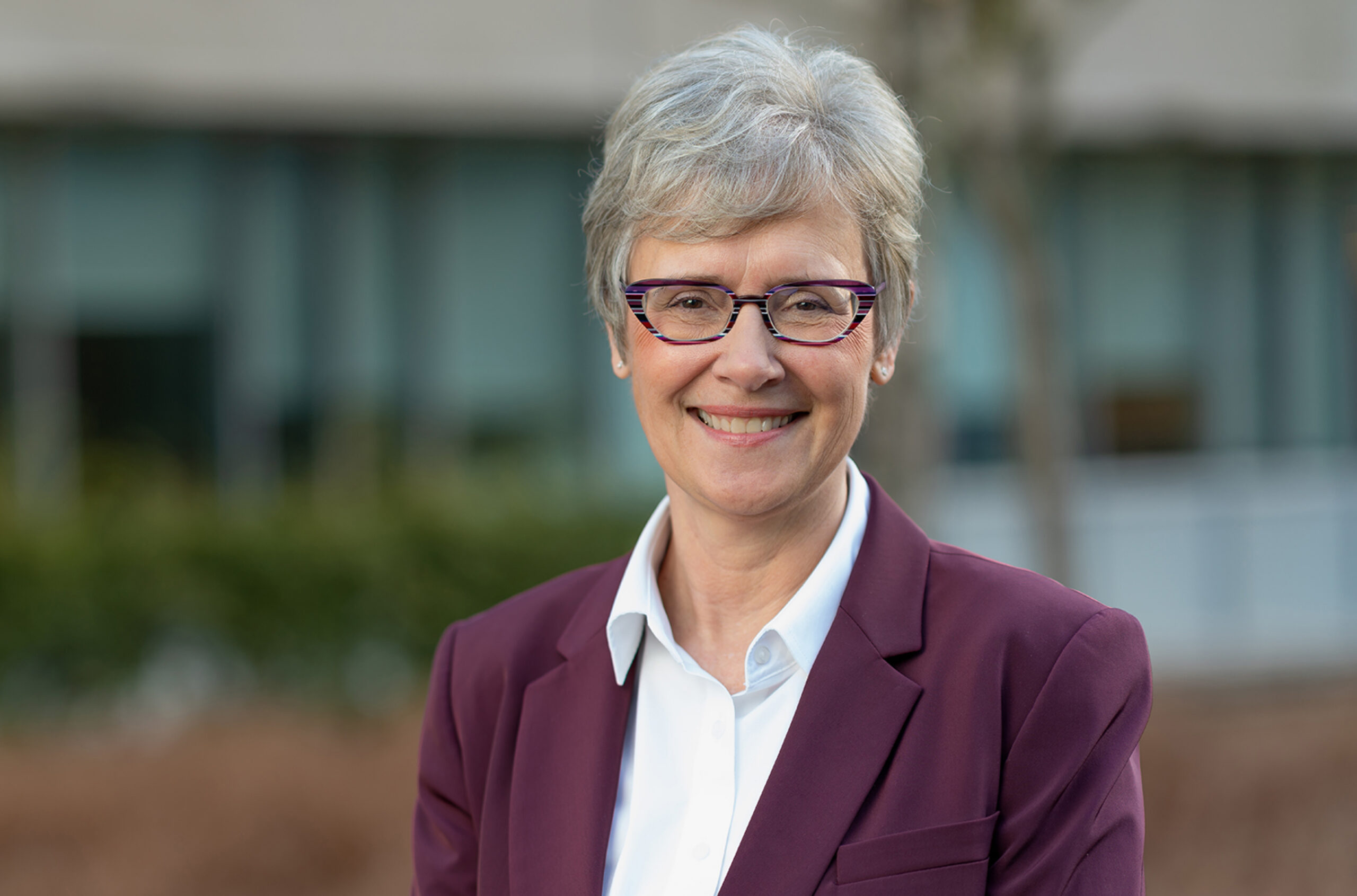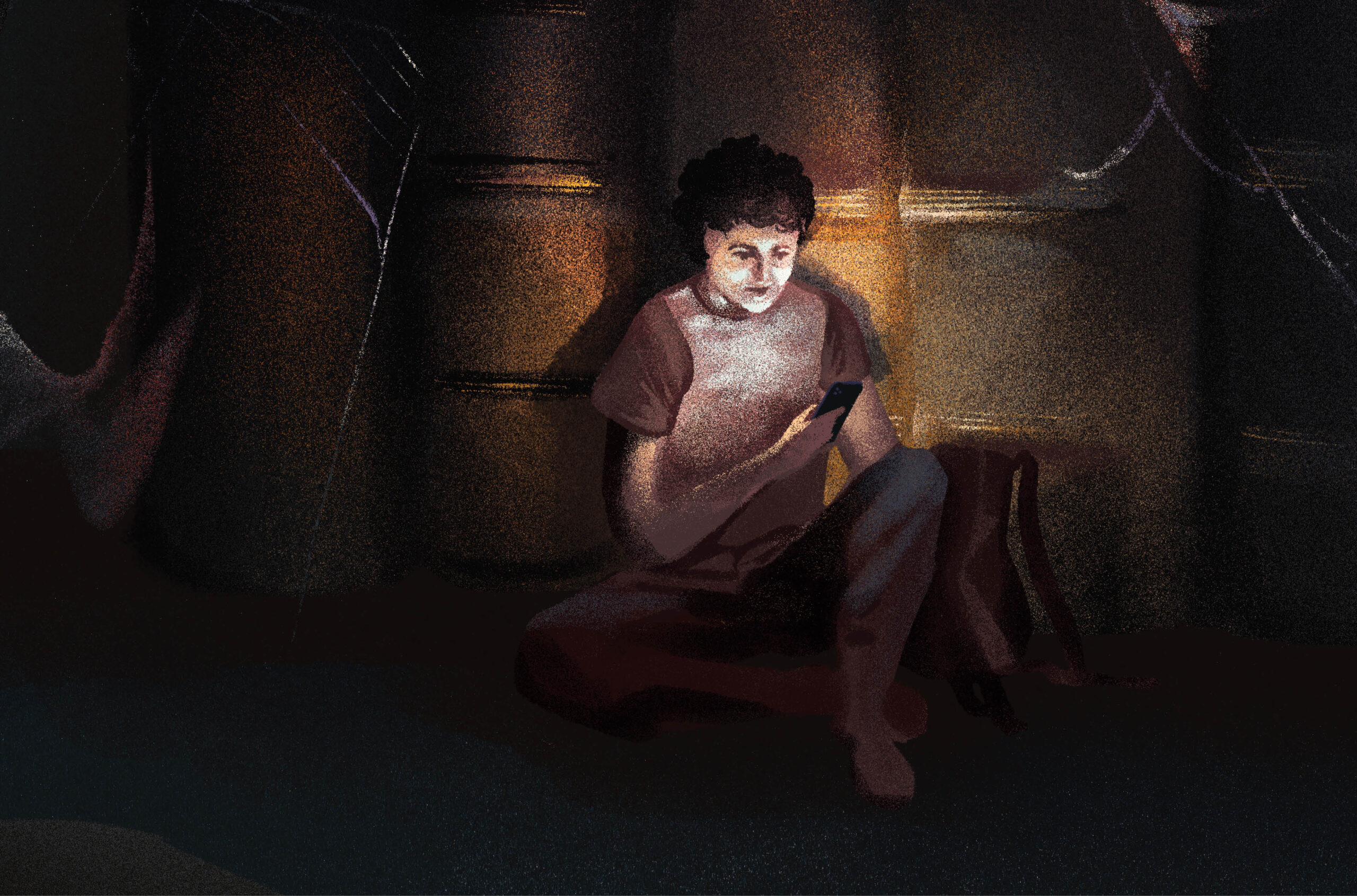Students with kids press universities for more support
“Parents felt very isolated. They didn’t fit in with the other students or feel welcomed.”

Five years ago, Kayla Madder unexpectedly became pregnant while finishing up a second undergraduate degree at the University of Saskatchewan. After taking eight months off following the birth of her son Amari, she started a master’s degree in animal and poultry science. Still nursing, she and another graduate student friend, also a parent, asked around campus for suggestions on where to breastfeed. “We called around to all of the places that we thought might be able to help us with finding a space and no one really knew. Some suggested using a bathroom, which isn’t safe to breastfeed in, and some suggested using our cars,” she says.
Fast-forward to today and things have changed significantly at the university, thanks in large part to the efforts of Ms. Madder, who created a group called Parents on Campus in the fall of 2014. As one of its first tasks, the group secured a breastfeeding room, for which Ms. Madder now acts as coordinator in addition to her full-time work as a lab manager in the university’s college of agriculture. The “comfort room” is secured with a PIN code and houses couches, a fridge and a microwave, a breastfeeding pillow, and toys and books for older children. “It gives a bit more privacy for moms that want to breastfeed or pump, but it’s also used to find community with other parents,” says Ms. Madder.
Offerings have grown even more since then. A second comfort room opened in January 2017 at the university’s Prince Albert campus. The parents group – also coordinated by Ms. Madder – now offers monthly information sessions on topics from car seat safety to meal planning to family law, and organizes family fun days and pool parties. A Facebook group and Instagram page help parents connect online. Family-friendly study sessions are in the works. The group has started collaborating with other campus groups and has been asked by administrators for input on university-wide initiatives such as a new wellness strategy.
If Ms. Madder’s success demonstrates what’s possible, the scenario she faced initially is still typical on many campuses today. However, some help may be at hand. The Canadian Association of College and University Student Services, or CACUSS, has created a sub-group of student services professionals “to share and generate new ideas for services and programs” for students with family responsibilities. Such support, says Ms. Madder, would clearly be welcomed.
Different institutions, different models
One of the longest-standing models for parenting support is the University of Toronto’s Family Care Office, established in 1993 as part of the university’s human resources and equity portfolio. With four staff members, the office helps to arrange family housing and daycare for students, faculty and university staff who are parents. It also provides breastfeeding spaces, and offers workshops and discussion groups on topics from family planning to leave policies. A website and Facebook group help connect parents, and in 2013 the office launched a mentorship program. (The office is not directed solely at new parents – it also offers support related to elder care, bereavement and divorce.)
At McGill University, Julia Pingeton provides services and events for parents in her role as the family resources coordinator in the Social Equity and Diversity Education Office, a position created three years ago. Ms. Pingeton uses a case-management approach to help individual students with pregnancy accommodation policies, daycare registration and more. The office also offers support to partners and, as a separate service, assists those with elderly dependents.
Programs include cooking workshops, with childcare included, “Study Saturdays” offering volunteer daycare in collaboration with the postgraduate student society, scholarships for the university’s summer sports camps, and events like family awareness day luncheons. McGill now has three breastfeeding rooms on campus and recently launched a mentorship program inspired by the one at U of T (it also gains inspiration from Concordia University’s Student Parent Centre, not part of the CACUSS group but active in student parent support).
At the University of Prince Edward Island, questions from students on Welcome Day held at the start of each academic year helped Anne Bartlett to realize the need to support student parents. As coordinator of Pathways to Academic Success in the university’s Centre for Teaching and Learning, she launched an inaugural event for families in a space originally intended for off-campus and commuter students. Now the event happens three times a semester, and is open to faculty and staff as well.
“One night, we had an associate registrar, a counsellor, a faculty member and another counsellor who was a grandmother. They brought their grandkids and their children. It gave the students an opportunity to chat with faculty and staff in a non-academic, more social setting,” recalls Ms. Bartlett. Between events, student parents keep in touch via a Facebook group, where other departments have also started sharing news of kid-friendly events, such as the music department’s Halloween celebration. “It’s really starting to catch on. We don’t have a staff person designated. We don’t have an office or a budget, but we see a need, so we’re reaching out and doing what we can with our volunteers,” Ms. Bartlett says.
At Université de Montréal, counsellor Martin Rioux was tasked by the student federation in 2009 to develop programming for student parents and has since built a series of monthly events that includes an orientation barbecue, apple picking in the fall, a Christmas event with Santa Claus and a sugar shack outing in the spring. Because they’re funded through student fees, unlike at some other universities, the U de M events are offered to student parents exclusively, and regularly attract between 50 and 100 participants. Since many student parents are immigrants or first-generation Quebecers, the events also focus on traditional activities so they serve a dual purpose of introducing them to Quebec culture.
Mr. Rioux says the reaction from parents has been very positive and adds that a Facebook group they’ve built to support the efforts has nearly eclipsed the in-person events in terms of interactions, although one does feed the other, he notes.
Quantifying the parent population
Not all universities have a formal budget to assist student parents, and those involved say a stronger case for institutional support could be made if the size of the student-parent population were known. The problem is, not many institutions are tracking these numbers and there is little solid data at the provincial or national levels.
At U of T, Family Care Office manager Kaye Francis tracks how many students the office helps directly – about 100 undergraduates and 400 graduate students, according to the office’s annual report – but she admits that likely doesn’t capture the entire population. At U de M, numbers aren’t formally tracked, but Mr. Rioux notes that about 18 percent of postsecondary students province-wide apply to a provincial bursary program to support parents. A 2013 report (PDF) by Quebec’s Conseil supérieur de l’éducation puts the number of student parents at around 25 percent.
Tricia van Rhijn, an assistant professor of family relations and human development at the University of Guelph, is one of the few Canadian academics researching student parents and mature students. Dr. van Rhijn started out as a mature student herself, resuming an undergraduate degree at U of Guelph in 2004 at the age of 34 after a six-month maternity leave turned into a 12-year break to raise her two sons.
For a study published in the Canadian Journal of Higher Education in 2011, Dr. van Rhijn accessed data from Statistics Canada’s Labour Force Survey and the Survey of Labour and Income Dynamics from 1976 to 2005. She found that between 11 and 16 percent of postsecondary students had at least one dependent child. There were more than twice as many female student parents as male student parents, and the percentages varied by region and type of institution – the numbers were highest in the Prairie provinces and, in general, college students were more likely to be parents than university students.
The study “put some numbers behind what we already suspected – that there was actually a greater number of student parents than anybody had thought,” says Dr. van Rhijn. She adds that, since the survey looked only at undergraduates and only at those over 25 (a typical
definition of mature student), the true percentage of student parents – incorporating undergraduates under 25 and graduate students – is almost certainly higher.
Dr. van Rhijn says she wishes more institutions would start collecting data on this student population. She suggests this information could be requested along with other status declarations on registration forms. Adding a declaration question to the U.S.-based National Survey of Student Engagement, which is used by many Canadian universities, would also be welcome, she says.
A sense of isolation
As part of her research, Dr. van Rhijn has conducted dozens of interviews with student parents. She says many report feeling invisible on campus. “I’ve talked to parents who are 22 or 23, so age-wise they’re no different [than other undergrads], but they feel completely different in terms of their life circumstances and responsibilities,” she says.
Student parents also report feeling guilty for spending time at school when they could be with their children. “It feels very selfish for many student parents,” says Dr. van Rhijn. “But at the same time, when you ask them about why they’re going back to school, their biggest motivation is to give their children a better life.”

At U of S, Ms. Madder collected similar reactions when she and students in the college of public health conducted a pilot survey of parents on campus. “A theme that kept coming up was that the parents felt very isolated,” says Ms. Madder. “Some of them felt stigmatized, that they didn’t fit in with the other students or didn’t feel welcomed.” The survey, which Ms. Madder plans to repeat and expand on in 2018, also revealed that nearly one in five student parents didn’t know about family resources on campus.
Identifying and communicating with student parents can be a challenge. At U of T, the Family Care Office does outreach via a link included in the online student registration form, at presentations during orientation week and in some classes, and through information posted on public screens around campus. At McGill, Ms. Pingeton says she communicates via newsletters, posters and through partnerships with offices like the international centre and student groups. It’s been effective, but could be even more so, she says. “We know that there are a lot of people who still don’t necessarily know what’s out there.”
While identifying parents at registration would help, many students become parents during their studies. Lisa Engel, an occupational therapist and PhD graduate from the Rehabilitation Sciences Institute at U of T, started her PhD in 2012, and had her son Jacob in 2014 at the age of 34. She took seven months of maternity leave before returning to complete her degree in the fall of 2017 (she’s now a postdoctoral researcher at Toronto Western Hospital).
Already living in the university’s family housing with her husband, Dr. Engel found out about the Family Care Office through posters in her building. She immediately accessed the services, seeking out the centre’s pregnancy group and advice on how to set up her maternity leave with her supervisor, department and even her funding agency.
Reflecting the experiences of others, she says, “I’ve met parents, or they’re on their way to becoming parents, and they have no clue [the support] is there.” Since becoming a parent, Dr. Engel says that so many people in her department asked about her path that she ended up organizing a panel discussion on parenting. She’s also served as a peer mentor for the Family Care Office and credits her family housing residence, with its regular community events, as a great help.
Suggestions on all fronts
Those who support student parents emphasize the need for universities to take action, no matter how small the gesture. “Every student has the right to get engaged in campus life. If we’re not providing them the opportunity to become involved, then it’s a disservice to those students,” says Ms. Bartlett at UPEI. She suggests that institutions with no budgets for parental resources can get creative by tapping into resources already on campus, such as recruiting education and nursing students to organize volunteer workshops.
Rather than prescribe a formula for what support should look like, Dr. van Rhijn circles back to data collection as a starting point. “Find out the unique needs for that population,” she says, “because from what I’ve seen it does vary from campus to campus.” She also warns against putting the onus on student parents. “We’re talking about a group of students who are exceptionally busy with additional responsibilities,” she says. Ms. Pingeton agrees: “I think it often ends up falling to student groups to form their own networks of support, which is just a wild thing to expect of people who are already balancing all of that,” she says.
Financial support is another area where advocates say student parents could use a boost. Recent changes to the Ontario Student Assistance Plan have made it easier for students out of school for four years or more to access funding, and some universities already offer bursaries designated for single parents, but more could be made available. Dr. van Rhijn adds that, when she was a student parent, she had trouble accessing funds because the expectations for her partner’s income were sometimes unrealistically high.

There are also various accommodations that professors might consider to help support student parents. Dr. van Rhijn uses tools like Google Hangout and Skype for office hours, and allows student parents to bring children to class or to Skype in when childcare falls through. U of T’s Dr. Engel says her supervisor was similarly understanding, offering meetings by Skype, especially when she was experiencing severe morning sickness. Showing flexibility when scheduling group work can also help – before or after class usually works better than weekends, when student parents often have family commitments.
At the extracurricular level, Ms. Pingeton says that student groups and departments can try to make events more family-friendly in terms of timing (lunch hours rather than evenings), location (not always at the student bar) and by providing child care. “Even if an event is super interesting, it has to be tied to my research for me to attend outside of daycare hours,” says Dr. Engel, adding that when she receives an email for events, the first thing she checks is the time of the event.
Dr. van Rhijn says it would be a real disservice to ignore the needs of student parents, since they tend to do well academically but are also overstretched trying to balance their studies with parental responsibilities. “The consequences are pretty dire. Because they’re trying to do all of these things, if one thing happens in their life and they can’t get to a class or whatever, it causes them to drop out,” she says.
At the same time, Dr. van Rhijn believes there’s a strong economic argument for bolstering the number of mature students, including parents, given demographic shifts leading to declines in the traditional student population entering directly from high school. “I think universities and colleges should be looking to mature students and student parents as a market that they could be tapping into,” she says.













Post a comment
University Affairs moderates all comments according to the following guidelines. If approved, comments generally appear within one business day. We may republish particularly insightful remarks in our print edition or elsewhere.